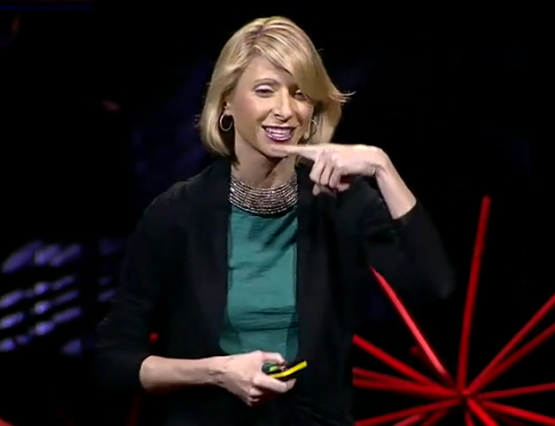So business schools have been struggling with this gender grade gap.
所以商學院一直以來都為男女生在參與上的差別傷腦筋。
You get these equally qualified women and men coming in and then you get these differences in grades,
入學的時候男女生不分軒輊,可是成績出來卻反映性別差異,
and it seems to be partly attributable to participation.
而看起來一部分原因和參與有關。
So I started to wonder, you know, okay, so you have these people coming in like this, and they're participating.
所以我開始思考,好吧,所以這群人一開始來是這副樣子,看起來積極參與。
Is it possible that we could get people to fake it and would it lead them to participate more?
那有沒有可能讓大家先假裝成那樣,進而讓他們能更積極參與進來?

So my main collaborator Dana Carney, who's at Berkeley, and I really wanted to know, can you fake it till you make it?
我在Berkeley的主要合作研究伙伴,Dana Carney,和我都很想知道,是不是能先假裝,到最后則成真?
Like, can you do this just for a little while and actually experience a behavioral outcome that makes you seem more powerful?
比如說,先小小假裝一陣子,然后在實際行為上體驗到一個讓你感到更加充滿力量的結果?
So we know that our nonverbals govern how other people think and feel about us. There's a lot of evidence.
我們都知道非口語語言會影響他人對我們的看法。有很多證據可以證明這一點。
But our question really was, do our nonverbals govern how we think and feel about ourselves?
但我們的問題是,我們非語言的部分,是否真的掌控我們對自己的想法和感受?
There's some evidence that they do. So, for example, we smile when we feel happy,
確實有證據支持這個說法。舉例來說,我們開心的時候會微笑,
but also, when we're forced to smile by holding a pen in our teeth like this, it makes us feel happy.
但同樣地,當我們被迫在口中咬住一只筆,呈現微笑的表情時,我們也會感到開心。
So it goes both ways. When it comes to power, it also goes both ways.
這說明這是相互的。說到力量的時候,亦是如此。
So when you feel powerful, you're more likely to do this,
所以當我們感到充滿力量的時候,你更加可能會這樣做,
but it's also possible that when you pretend to be powerful, you are more likely to actually feel powerful.
但你也可能假裝自己很有力量,然后真的感到力量強大。











